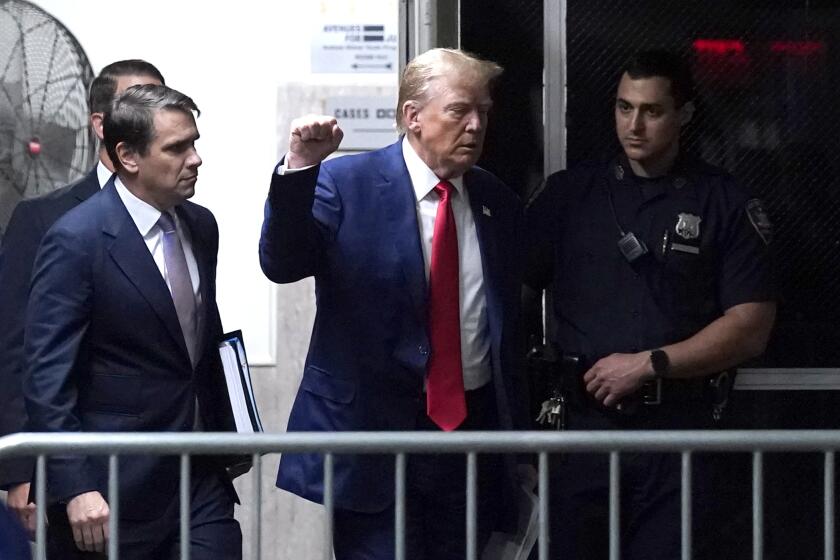China Wants to Ring Down Curtain on Taiwan Charade
How’s this for chicanery?
Last week, an American official who pretends he has no connection to the U.S. government hosted a private dinner here for a well-known Asian political leader from a country the United States pretends does not exist.
Although some self-acknowledged Clinton administration officials came, the diners (including the visiting Asian politician) were sworn to secrecy. “We agreed not to say who was at the dinner,” explained the mild-mannered American host, amiably brushing off my questions.
This probably sounds like some new skulduggery by the CIA. It’s not. In fact, it’s the standard way Washington now does business with Taiwan.
After 20 years, you might say this is the New Status Quo to which America and Taiwan have become accustomed. Indeed, few in either Washington or Taipei are eager to disturb this peculiar accommodation. China, however, may have other ideas.
Likely Taiwan Candidate
The Asian visitor was Chen Shui-bian, the likely presidential candidate next year for Taiwan’s Democratic Progressive Party, which has espoused the cause of independence for the island and its 21 million people.
The host at the dinner was Richard Bush, the head of the Washington office of the American Institute in Taiwan. AIT is the supposedly private entity set up by an act of Congress in 1979 to handle American contacts with Taiwan after the Carter administration cut off ties with its Nationalist government and established diplomatic relations with Beijing. Bush has held several government posts, most recently as the Clinton administration’s national intelligence officer for East Asia.
For years, America’s roundabout way of doing business with Taiwan was under challenge. Supporters of Taiwan chafed at the lack of official recognition. Why, they asked, can’t officials from Taiwan meet openly with U.S. officials during the daytime at the State Department or White House like everyone else?
Now, however, most people in Taiwan and America seem to have settled in and accepted, however grudgingly, the New Status Quo.
The likely purpose of last week’s secret dinner was for U.S. officials to assess whether Chen, if elected president next year, might do something to cause a new crisis in the Taiwan Straits.
China, which claims sovereignty over Taiwan, has threatened to invade if Taiwan formally declares independence. Chinese officials have also warned against any plebiscite on Taiwan’s future, an idea that is being pressed by advocates of independence for the island.
In Washington last week, Chen went out of his way to be reassuring. He said that if Taiwan’s Democratic Progressive Party comes to power, it will be “a peacemaker, not a troublemaker.”
Chen says he is eager to keep things as they are. “We seek to maintain the status quo of Taiwan’s independence,” Chen told me in an interview. Those words may sound incendiary, but the important fact is that Chen does not call for an explicit declaration of independence.
How about a plebiscite on the island’s future? The people of Taiwan have the right to hold one, Chen answered, but there doesn’t need to be one immediately. He added, however: “Any change in the status quo would have to be approved by the people. A referendum would be one of the methods of approval . . . but not the only one.”
No one in Washington seems to be eager for any sudden changes on Taiwan, either.
At a recent conference, Assistant Secretary of State Stanley Roth was asked whether the Clinton administration, with its worldwide commitment to democracy, would favor a plebiscite on Taiwan’s future. “It’s hard to see what a plebiscite would accomplish in a positive manner,” he replied. Taiwan’s future, he said, is going to be determined through talks with the mainland.
In Congress, Rep. Christopher Cox of Newport Beach, who has led the Republican challenges to President Clinton’s China policy, chooses his words judiciously when it comes to Taiwan.
“The United States should not support independence, because the United States should not put its thumb on the scale and determine the outcome from afar,” Cox said in an interview. “But if that is the solution the Chinese come up with, they are entitled to it.”
No Push for Changes
If even the leader of Taiwan’s main pro-independence party isn’t eager to push for changes in the island’s status, and Washington isn’t either, then what’s the problem here?
That’s easy. The status quo is no longer acceptable to China. Leaders in Beijing fear Taiwan is drifting slowly toward independence, and they are determined to change the dynamics--so that Taiwan will be forced to negotiate and opt for some form of reunification. That’s why China is in the process of building up its missile forces in areas near Taiwan.
What to do? The Pentagon wants to give new weaponry to Taiwan. Congress seems eager to protect Taiwan with missile-defense systems. The State Department argues that arms can’t protect Taiwan, but diplomacy might.
It took Washington and Taiwan 20 years to get used to doing business through private dinners that are treated like covert operations. Now, both sides are trying to protect what they have created. It won’t be easy.
More to Read
Start your day right
Sign up for Essential California for news, features and recommendations from the L.A. Times and beyond in your inbox six days a week.
You may occasionally receive promotional content from the Los Angeles Times.






